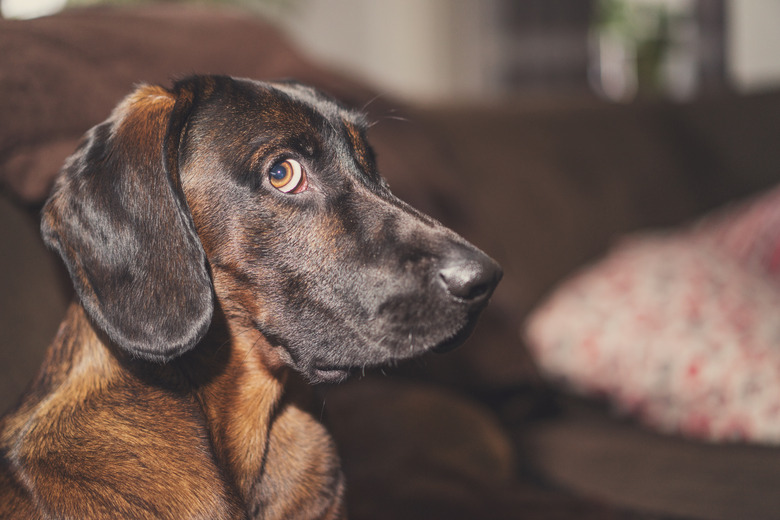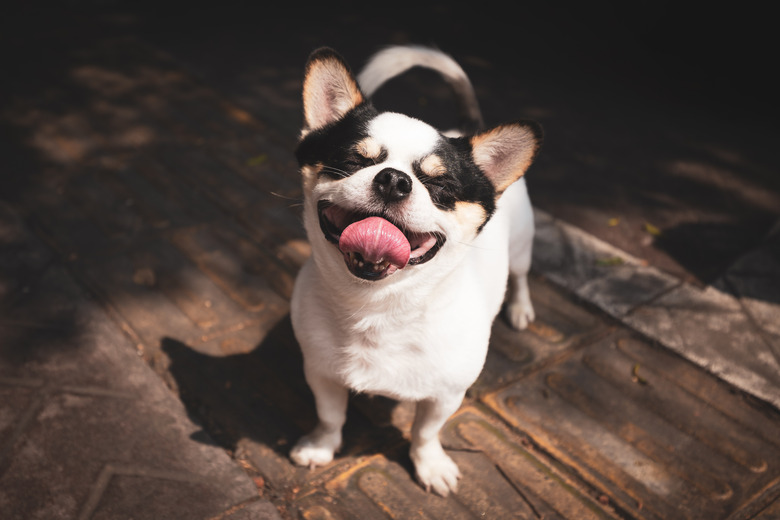Why Did My Housebroken Dog Start Peeing In The House?
You can't believe your eyes! How could your wonderful, housebroken dog be peeing in the house? When a dog suddenly starts urinating in the house, it can be due to multiple causes.
To get to the root of the problem, your first step is a trip to your veterinarian to rule out any underlying medical conditions that may be causing or contributing to her inappropriate urination. With treatment, most conditions that cause frequent urination and therefore lead to peeing in the house can be managed, which reduces or eliminates accidents in the home.
If your dog's problem turns out to be purely behavioral, you'll need to work on correcting this surprising lapse in her potty etiquette. But, take heart; most dogs respond quickly. Soon, she'll be back to her old, reliable habit of letting you know when she needs to go outside.
What to do if your dog starts peeing in the house
What to do if your dog starts peeing in the house
If you've caught your housebroken dog peeing in the house for the first time, you may understandably feel angry and overwhelmed. But don't overreact. In fact, don't react at all, as difficult as it might be. Just make sure you interrupt him. Then, quickly put your dog on a leash and take him outside to finish his business.
If you happen to have a treat tucked into your pocket, even better, give it to him while he's relieving himself out there and when he's done, lavish on the praise for being a good boy. Are you ignoring the deed? No, you are rewarding him for going to the bathroom outside instead of giving him negative attention for peeing inside.
What not to do if your dog starts peeing in the house
What not to do if your dog starts peeing in the house
Don't yell, and never punish your dog for peeing in the house, or you will risk more complex behavioral problems. For one, your dog will fear you. Aside from the negative impact this will have on your relationship going forward, harsh discipline has a domino effect, and you may end up with several behavioral problems instead of just one.
Medical conditions that cause or contribute to peeing in the house
Medical conditions that cause or
contribute to peeing in the house
If your housebroken dog has started peeing inside the house, a medical problem could be to blame. For instance, it's not uncommon for a spayed female dog to develop urinary incontinence, an accidental or involuntary loss of urine from the bladder usually during sleep. On the other hand, if your female dog is awake, and out of the blue, she starts squatting to urinate in the house, it's possible she has a urinary tract infection, or UTI.
Other diseases and disorders that can cause frequent urination in both sexes, which inevitably will sometimes occur inappropriately, are Cushing's disease, diabetes, bladder stones, kidney disease, and UTIs involving not only the bladder, but also, the kidneys, ureters, or urethra.
To aid in his diagnosis, your vet will do a complete physical examination and run laboratory tests. If a medical problem is diagnosed, your dog will undergo a treatment protocol to manage the condition.
Keep in mind that most of these disorders and diseases can be managed successfully, thus eliminating or at least controlling the incidence of urination inside the home. In the case of diabetes, for example, once treatment begins, your dog's blood sugar will soon be regulated, and eventually, your dog will be back to normal and pointedly letting you know when she needs to go outside to do her business.
When your old dog starts peeing in the house
When your old dog starts peeing in the house
Another condition that is directly related to aging can cause an older dog to start peeing inside the house. Canine cognitive dysfunction, or CCD, also known as dog dementia, is akin to human Alzheimer's disease. Your old friend may simply become absent-minded, forgetting he's supposed to go potty outside.
In this case, to reduce the negative impact of indiscriminate urination, back-leg support harnesses can help get your dog outside on time, diapers made specifically for dogs may be used when needed, or pee pads can be handy for times when it may be necessary for him to urinate indoors.
Consult with your veterinarian if your senior dog seems to have forgotten his house training. There are medications and nutritional supplements available that can help a dog cope with his golden years, or a case of CCD or senility.
Behavioral reasons for peeing in the house
Behavioral reasons for peeing in the
house
Keep in mind, if your housebroken dog has started peeing in the house, it's a common problem, and you're not alone. Sadly, up to 25% of dogs who are surrendered to animal shelters by their owners are given up due to difficulties with housebreaking. But while inappropriate urination may require sharpening up her house training skills, or behavior modification, the time and effort to fix the problem is, of course, more than worth it. Your vet or a canine behavioral therapist can help you sort out what to do for a variety of behavioral issues, particularly anxiety disorders, that can lead to inappropriate urination.
Here are some of the reasons that may trigger a dog to start urinating inside the home. Remember, verbal reprimands or punishment exacerbates the problem:
- Being left alone too long on a regular basis.
- Marking territory usually on upright objects caused by stress, new furniture, or hormonal influences.
- Excitement upon greeting you or when company comes to visit, which is more common in puppies.
- Anxiety disorder, obsessive-compulsive disorder, or separation anxiety.
- Submissive urination usually occurring in puppies or female dogs.
- Change in the household environment, such as a new baby or a family member leaves.
- Adopted shelter dogs may never have been fully housetrained. Living arrangements inside a shelter are generally a crate or a confined space, so lack of house training has not been observed since dogs do not like to soil in their bed. Also, an adopted dog, particularly a small dog, may have a history of peeing inside the house on pee pads.
House training refresher
House training refresher
If it comes down to a house training refresher, you'll need some tools at hand. Crates for keeping your dog in a confined space when you can't supervise, belly bands for male dogs, and a significant investment of time and patience is a prerequisite for success. Consult your vet or a canine behavior therapist for tips.
Attaching your dog to your belt or placing the leash around your waist so your dog has to move in concert with you is also an excellent technique for dealing with many behavioral problems, such as inappropriate urination as it allows a close eye on her every move.
Bottom line, be vigilant, be consistent in your training, and don't skimp on rewards, such as treats and praise, whenever your dog pees in the great outdoors.

